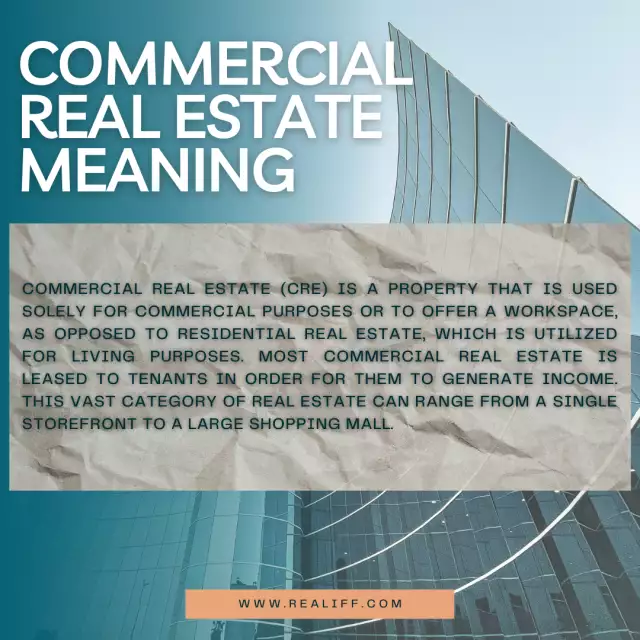Commercial Real Estate Meaning
Commercial real estate (CRE) is a property used solely for commercial purposes or to offer a workspace, as opposed to residential real estate, which is utilized for living purposes. Most commercial real estate is leased to tenants for them to generate income. This vast real estate category can range from a single storefront to a large shopping mall.
Commercial Real Estate Fundamentals
The two basic types of real estate property are real estate commercial and residential real estate. Residential properties are structures only used for human dwellings and not for commercial or industrial purposes. Business real estate is utilized in commerce, as the name implies, and multiunit rental properties that serve as residences for renters are classified as commercial operations for the landlord.
This sector is often classified into four types based on function:
- Office space
- Industrial use
- Multifamily rental
- Retail
Commercial Leases
Some firms own the buildings in which they operate. The more common scenario is that the business property is leased. The building is typically owned by an investor or a group of investors who pay rent from each business that works there. Commercial lease rates—the cost of occupying a space for a set length of time—are often indicated in annual rental dollars per square foot. On the other hand, residential real estate rates are quoted as an annual sum or monthly rent.
Commercial leases normally range from one year to ten years or more, with office and retail space averaging five to ten years. In contrast, yearly or month-to-month residential leases are more short-term.
Managing Commercial Real Estate
Owning and managing leased commercial real estate necessitates the owner's full and continuing management. A management firm can help property owners discover, manage, and retain tenants, handle leases and financing choices, and coordinate property upkeep and marketability. A commercial real estate management company's specialist knowledge is useful because the rules and regulations regulating such property differ by state, county, municipality, industry, and size.
Landlords must frequently strike a compromise between increasing rents and reducing vacancies and tenant turnover. Turnover can be expensive for CRE owners since space must be changed to accommodate the individual needs of different tenants, such as if a restaurant moves into a property that a yoga studio previously occupied.
Benefits of CRE
Investing in commercial real estate can be rewarding and serve as a hedge against stock market volatility. Investors can profit from property appreciation when they sell, but the majority of their returns come from tenant rents. One of the most significant advantages of commercial real estate is the low cost of leasing. If you are considering investing in commercial real estate, you can easily find professionals in REALIFF. Commercial real estate can provide remarkable returns and significant monthly cash flows in regions where new construction is prohibited by land or law. Industrial buildings typically have cheaper rents than office towers, but they also have lower overhead expenditures.
In addition, commercial real estate has lengthier lease arrangements with renters than residential real estate. As long as long-term tenants occupy the facility, the holder benefits from significant cash flow stability.
Commercial real estate, As well as providing a stable and lucrative source of income, has the potential for capital appreciation as long as the property is well-maintained and kept up to date. And, like all types of real estate, it is a distinct asset class that may effectively diversify a well-balanced portfolio.
Drawbacks of CRE
Rules and regulations are the biggest deterrents for most people who directly desire to invest in commercial real estate. Commercial property taxes, purchase mechanics, and maintenance responsibilities are hidden beneath layers of legalese. These standards vary by state, county, industry, size, zoning, and a variety of other factors. Most commercial real estate investors have specialized knowledge or a team of people that do.
Another impediment is the heightened risk of tenant turnover, which is especially important in an economy where unexpected retail closures leave properties vacant with little warning.
When it comes to dwellings, one tenant's facility needs frequently mirror those of prior or prospective occupants. In the case of a commercial property, however, each renter may have quite diverse needs that necessitate significant renovations. The building owner must then modify the area to meet the particular trade of each tenant. Due to the cost of improvements for incoming tenants, a commercial property with a low vacancy but rapid tenant turnover may nevertheless lose money.
Buying a home property is a significantly more expensive proposition for those wishing to invest directly than buying a residential home. Furthermore, while real estate, in general, is one of the more illiquid asset classes, commercial building transactions move especially slowly.
Learn more about commercial real estate: https://realiff.com/post/PZhA9PAIRK38/what-exactly-is-the-distinction-between-commercial-real





